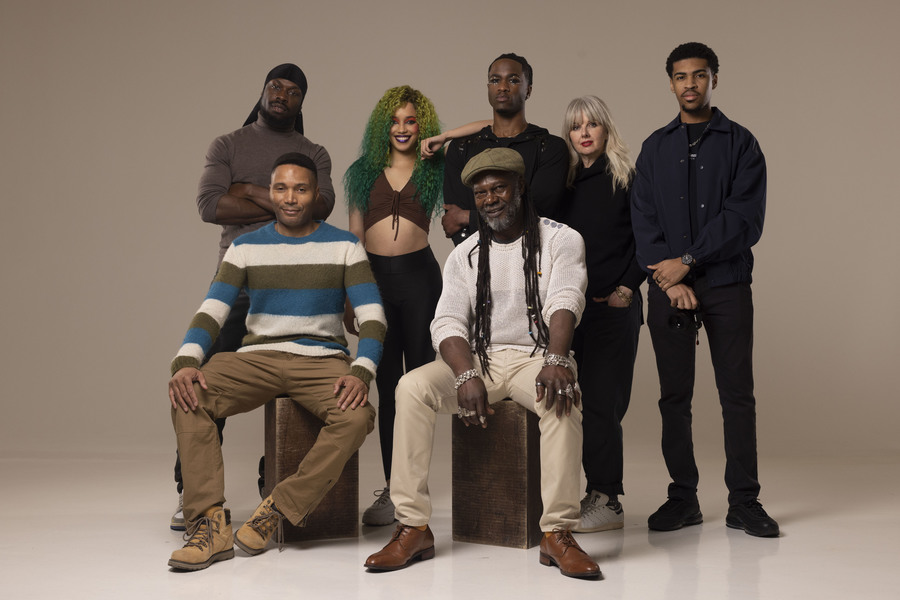Interview: Levi Roots
Reggae legend Levi Roots chats about his first foray into the world of musical theatre with Sound Clash: Death in the Arena

To get to the root of why reggae artist, entrepreneur, and St Paul’s Carnival director Levi Roots has chosen to dabble in musical theatre, we first have to go back to 2007, when he successfully pitched his kitchen staple Reggae Reggae Sauce to Dragon’s Den. "Everybody said to me, 'Levi, don't take the guitar,'" he says. "But I wanted to bring something different to the table. It's the same thing – a couple of years ago, I thought to myself, well, I've never seen a stage play about dancehall music and sound systems."
Sound Clash: Death In The Arena is Roots’ first stage production, set in a dystopian world ruled by two rival sound systems. As The Thunders and The Eagles battle for supremacy in Sound City, two starcrossed lovers find themselves caught between. Roots says that he’s remixing classics like Romeo and Juliet and West Side Story, but with one crucial difference. “I want to do a ‘sound play’, which is mixing sound systems and stage acting together,” he says.
Roots spent 45 years embedded in sound system culture, holding down residencies with London’s Sir Coxsone Outernational after he left school. He’s peppered his musical with the scene's key ingredients – the dancing, the selecting and the classic reggae records that form a DJ’s weaponry at a sound clash, beefed up onstage by the familiar weight of bass. “This is what makes it the first dancehall musical. Instead of the artist singing, it's a sound system that's going to play the songs,” he says. “I wanted it to be authentic. When you say ‘sound clash’, for people that know abourt sound systems – like David Rodigan or Coxson or Saxon Sound System – it's like a war in there.”
Part of his motivation for putting sound system culture onstage has been to introduce it to new audiences. “I was always thinking of how I can bring this fantastic genre to the mainstream," he says. Despite its sizeable impact on music on both sides of the Atlantic, Roots believes that Jamaica’s export still doesn’t get the full credit it deserves for inspiring genres like drum & bass, jungle, grime and hip-hop. “The great Jah Shaka is responsible for these young artists who are making millions out of these types of music,” he says. “Kool Herc is down in history as one of the key people that brought Jamaican music to America. Rapping has become like sliced bread now.”
Implied in any celebration of sound systems is a tribute to the Windrush generation, whose outsized impact on British culture began with the records they imported. "The Windrush people used sound systems to gather themselves when they came to this country," says Roots. "They were creating music in their houses, then having competitions between each other with a normal old radiogram." Just as West Side Story once drew from Latin music to portray New York’s evolving demographics, Sound Clash evokes the vibrancy of multicultural Britain, though with a degree of authenticity that Bernstein could not match. To bring his story to life, Roots enlisted help from an old school friend, the award-winning author Alex Wheatle MBE (who also happens to be a graduate of the Crucial Rocker sound system, where he DJed as Yardman Irie). “Alex fell in love with the whole thing, because that's his background as well,” says Roots.
At its heart, Sound Clash is a story about overcoming adversity – something that Roots knows plenty about. “I proved to the world that you can be a dreadlocked Rastaman from Brixton that sings a little bit, cooks a little bit,” he says. Now he’s a cultural ambassador, helping to throw open doors into the theatre industry or encouraging hopeful entrepreneurs at St Paul’s Carnival. Only the day before we speak, he's been at Buckingham Palace at the King’s invitation, marking the 75th anniversary of the Windrush. “My mum died a couple of years ago,” he says, “and I know she would have been proud to know that she came from Jamaica with absolutely nothing but a dream, and now we're representing that generation. I do it for her.”
 Floods of Fire with Electric Fields & the ASO
Floods of Fire with Electric Fields & the ASO
 Review: Time Machine
Review: Time Machine
 Review: Antigone in the Amazon
Review: Antigone in the Amazon
 Review: I Hide in Bathrooms
Review: I Hide in Bathrooms